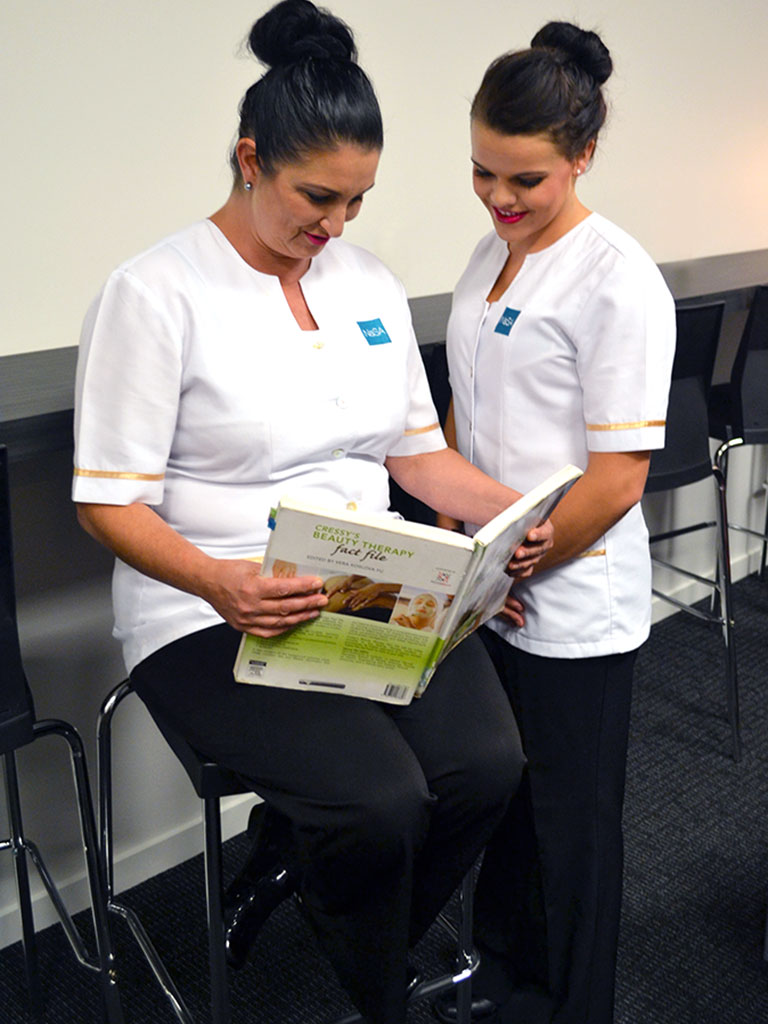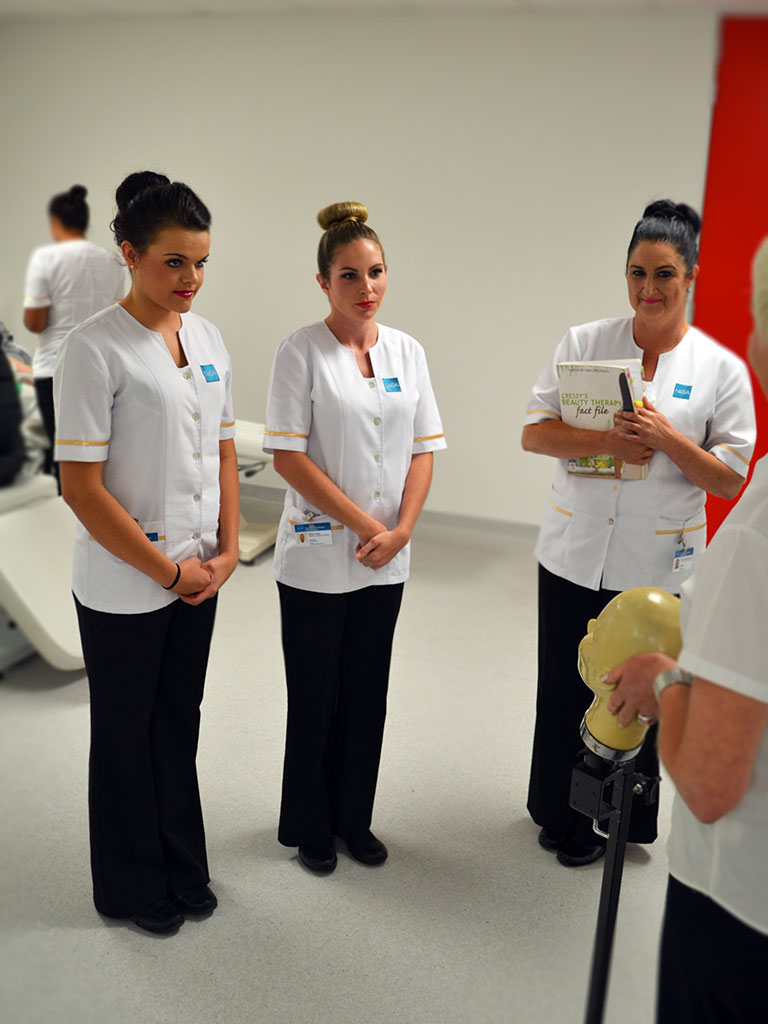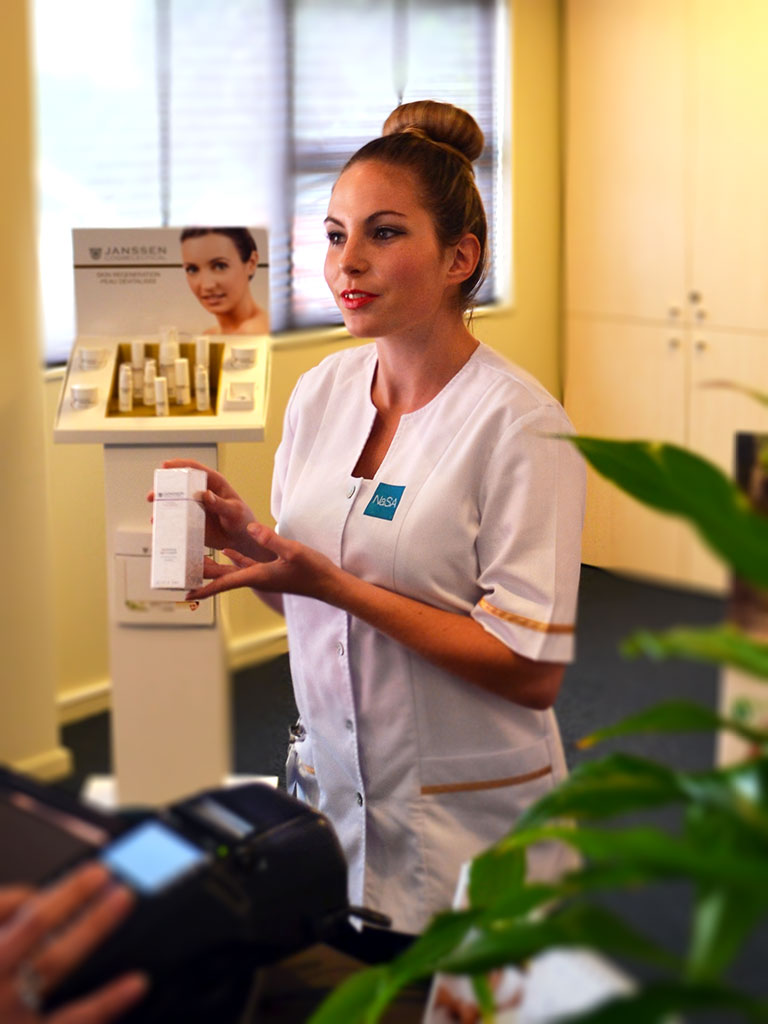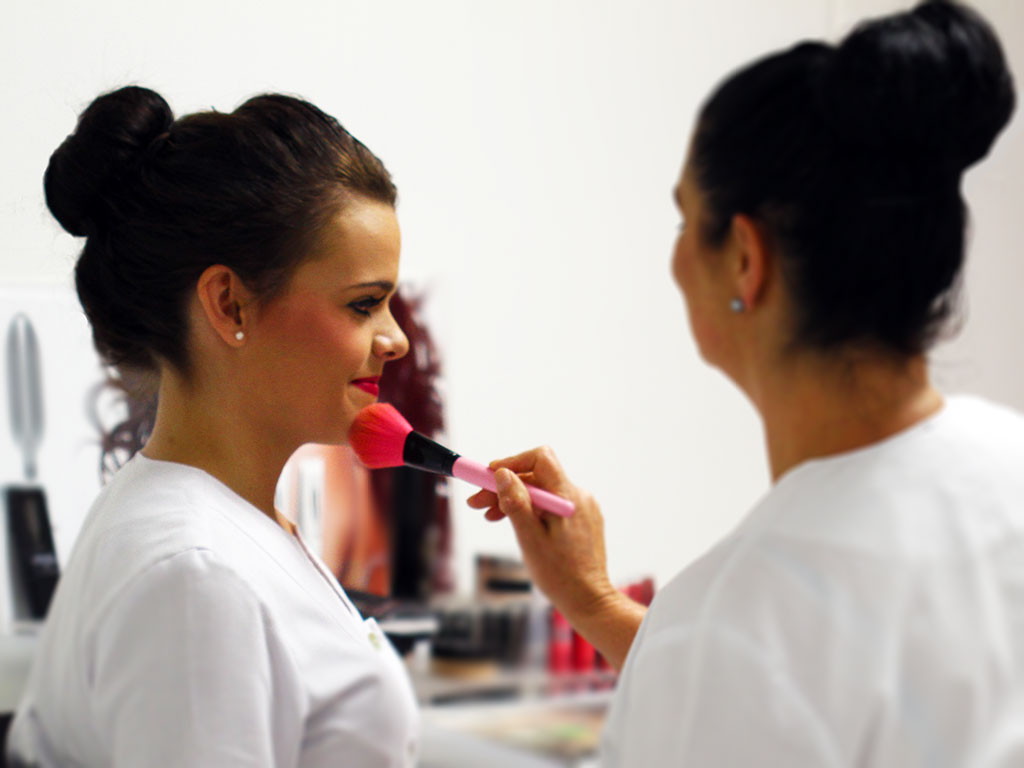Your Appearance and Health and Safety Is Important While Studying at The National School of Aesthetics
Uniform and hygiene, as well as appearance, are very important in our industry, and we try to instil the industry’s values in our ākonga / students to prepare them for the industry.

Quick Links about Uniform and Hygiene
Photos of Uniform and Appearance
Below, you will find photos of our ākonga / students with acceptable uniform tops, acceptable trousers, acceptable shoes, hair correctly tied back, and correct make-up. Many special thanks to Delwyn, Ashley, and Milly for helping us with these pictures.
The uniform top is now black, not white, as pictured. It is the same design, though.
Uniform
Compulsory Parts of the Uniform
The compulsory parts of the uniform are:
Spa Top
You can purchase your spa top through The National School of Aesthetics.
Our Student Liaison Officer will talk to you about this before the programme starts.
Business Dress Pants
Acceptable Business Dress Pants
Business dress pants should be:
- Black
- Full length
- Normal to boot-cut or slightly flared cut
- Professional in appearance
- Flexible enough and roomy enough to crouch and deliver body massage in them
Unacceptable Business Dress Pants
Business dress pants should not be:
- Any other colour but black
- 3/4 length or 7/8 length
- Tight-fitting or extremely flared
- Jeans, leggings, tights or haram pants
- So tight or inflexible they strain or tighten when crouching
Shoes
Your shoes should be:
- Black
- Plain
- Flat-soled
- Closed-toe
- Closed-heel
- Slip-on
- Made of a sturdy material (like leather)
- Without a heel or with a really low heel
- Without laces
Pantyhose or Socks
You should wear pantyhose or socks on your feet and lower legs under your dress pants
Breath Mints or Breath Fresheners
Breath mints or breath fresheners keep your breath fresh when you are working close to your client. See the school rules and regulations in the Student Handbook for more information.
Student ID Badge
You purchase your ID badge from the school on the first day, and you must wear it every day once you are studying on campus.
Hair Fastener
You need to hold your hair up and back off your face and shoulders. See the school rules and regulations in the Student Handbook for more information.
Variants of regulation uniform items are not allowed. We will mark you non-competent if you wear non-approved variants.
We have supplied photos above.
Optional Parts of the Uniform
The optional parts of the uniform are:
Cardigan
Your cardigan should be:
- Plain
- Black
- Button-up
Earrings and Piercings
There may be restrictions on earrings and piercings in your programme. See the school rules and regulations in the Student Handbook for more information.
Appearance
Appearance is a very important part of our industry.
Some issues you may need to be aware of include:
Makeup
You must wear makeup every day to course. Ākonga / Students wear makeup to maintain a professional appearance and, for certain classes, to learn how to remove and reapply make-up.
Natural and light make-up style will be sufficient. Please ensure you meet the guidelines in the school rules and regulations.
We have supplied photos above.
Hair
Your hairstyle needs to look professional and to maintain hygiene in the easiest way possible.
Your hair should be off your collar and out of your eyes, so your hairstyle should be one that can be pulled back out of the eyes and kept off the collar. Your hairstyle should also be within the guidelines in the school rules and regulations, and should be professional and well-maintained in appearance.
We have supplied photos above.
Nails
As many of the ākonga / students we have are performing treatments, nails need to be kept short and hygienic. Our tutors will tell you more on the first day.
You are not allowed to wear false nails of any type, unless approved by a tutor.
We have supplied photos above.
Jewellery and Piercings
While you are at the course, we ask that you only wear ear piercings. All other piercings should have a plastic sleeper placed in them or let heal while at the course, mainly due to health and safety issues.
Our electrical equipment can leech impurities from metal and tattoo you whether you are the therapist or client. It can also, at times, burn you.
We bear no responsibility if you do not replace or remove your piercings and are injured in the process.
We have supplied photos above.
Personal Hygiene
Personal hygiene is important to ensure the health and safety of your clients, your classmates, your tutors, others and yourself. Being as hygienic as possible helps stop the spread of minor illnesses such as colds and influenza and some major illnesses such as glandular fever and certain strains of hepatitis.
Some issues you may need to be aware of include:
Fresh Breath
You should have fresh breath as you are working closely with a client or therapist, one-on-one. Breath that is not fresh is not nice for the person you are working with. You will be expected to have fresh breath when working with clients in the industry, so we require it at the school as well. We ask all ākonga / students to carry breath fresheners or tabs at all times.
To make sure your breath is fresh, you should:
- Brush your teeth after every meal
- Floss your teeth at least once a day
- Use mouthwash after brushing your teeth
- Use breath fresheners to “top-up” your fresh breath
- See your dentist and dental hygienist at least once a year
Perfume and Body Odour
You should have a pleasant body odour at all times. You work closely one-on-one with other ākonga / students and clients, so body odour needs to remain pleasant. In many cases, you are trying to relax the client, and pleasant body odour help add to the experience.
To make sure your body odour is pleasant, you should:
- Take a shower or bath at least once a day
- Clean yourself properly, using soap, warm to hot water and shampoo for your hair
- Dry yourself off properly once out of the shower or bath
- If you use a body moisturiser or other body product, ensure you wait for it to dry before putting clothes on
- Exfoliate your body once a week to remove dead skin cells
- Ensure your uniform is cleaned according to manufacturer’s instructions
- Use a hygienic booster to wipe out germs and bacteria on your uniform
- Use deodorant with antiperspirant and light body spray or perfume
- Use deodorants and body sprays or perfumes lightly (do not overuse)
- If you smoke, use a body spray to mask the smoking odour
- If you smoke, wash your hands and arms after smoking
Sneezing and Coughing
Sneezing and coughing are the body’s way of spreading viruses and other infectious things.
If you sneeze or cough, you should:
- Wash your hands
- Keep your hands and other areas clean
- Protect others by sneezing or coughing into your hands, if you aren’t wearing a mask, and then wash your hands without touching anything else
- Avoid contaminating items by not touching them after you have sneezed or coughed on your hands
- Wear a mask to stop the spread of illness
- Take medicine to alleviate or reduce the symptoms (with medical advice)
- If required, take time off and gain a medical certificate from your doctor
Washing Your Hands
You should wash your hands to protect your clients, classmates, tutors, others and yourself. Hygiene is very important in these industries.
You should wash your hands whenever they become (or you suspect they become) contaminated. Examples of this include:
- After sneezing or coughing into your hands
- After touching rubbish, the rubbish bin or other contaminated area or material
- After touching your hair or own skin
- After touching anything that a lot of people may have touched (door knobs, handles, et cetera)
- After going to the toilet
For Ākonga / Students Who Smoke or Vape
If you are a smoker or if you vape, you need to ensure:
- Your breath remains fresh
- Your hands are washed and do not smell like smoke
- Your uniform smells fresh and not like smoke
Body spray helps mask or eliminate the smell of smoke on your body and uniform.
You need to wash your hands to help reduce or eliminate the smell of smoke on your hands. Your client will not enjoy her facial or treatment if your hands smell like smoke.
As we are a training establishment covered by the Smokefree Act and subsequent amendments, you cannot smoke or vape within 100 meters of the premises. This includes the footpath in front of our premises. Please smoke or vape in your car or in the park across the street.




